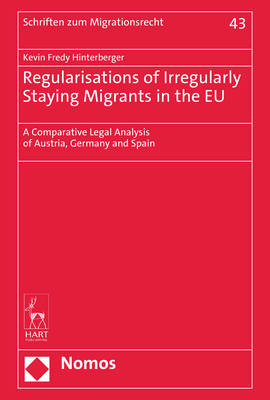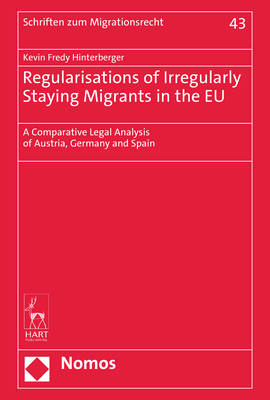
Door een staking bij bpost kan je online bestelling op dit moment iets langer onderweg zijn dan voorzien. Dringend iets nodig? Onze winkels ontvangen jou met open armen!
- Afhalen na 1 uur in een winkel met voorraad
- Gratis thuislevering in België vanaf € 30
- Ruim aanbod met 7 miljoen producten
Door een staking bij bpost kan je online bestelling op dit moment iets langer onderweg zijn dan voorzien. Dringend iets nodig? Onze winkels ontvangen jou met open armen!
- Afhalen na 1 uur in een winkel met voorraad
- Gratis thuislevering in België vanaf € 30
- Ruim aanbod met 7 miljoen producten
Zoeken
Regularisations of Irregularly Staying Migrants in the EU
A Comparative Legal Analysis of Austria, Germany and Spain
Kevin Fredy Hinterberger
€ 100,45
+ 200 punten
Omschrijving
'Combatting' irregular migration is one of the key challenges to migration management at EU level. The present book addresses perhaps one of the most pressing structural problems regarding the EU's return policy: the low return rate of irregularly staying migrants. Even though Member States must issue a return decision according to the Return Directive, only 40% of such decisions are enforced. Despite all of the political and legal efforts made, the EU is not making any significant progress in enforcing the rules laid down in the Return Directive. Possible solutions can be found in the national legal frameworks of selected EU Member States, which is why Austria, Germany and Spain are examined comparatively. These three Member States use, inter alia, differentiated systems of regularisation (i.e. the award of residency rights) to combat the problem of irregularly staying migrants. Regularisations constitute an effective alternative to returns, because they terminate the irregular residence of migrants, not through deportation, but rather by granting a right of residence. Hence, this book defends the following thesis: EU regularisations supplementing the present return policy are more effective at combatting irregular migration at EU level.
Specificaties
Betrokkenen
- Auteur(s):
- Uitgeverij:
Inhoud
- Aantal bladzijden:
- 398
- Taal:
- Engels
- Reeks:
- Reeksnummer:
- nr. 43
Eigenschappen
- Productcode (EAN):
- 9783848772704
- Verschijningsdatum:
- 27/02/2023
- Uitvoering:
- Hardcover
- Formaat:
- Genaaid
- Afmetingen:
- 152 mm x 226 mm
- Gewicht:
- 6935 g

Alleen bij Standaard Boekhandel
+ 200 punten op je klantenkaart van Standaard Boekhandel
Beoordelingen
We publiceren alleen reviews die voldoen aan de voorwaarden voor reviews. Bekijk onze voorwaarden voor reviews.











